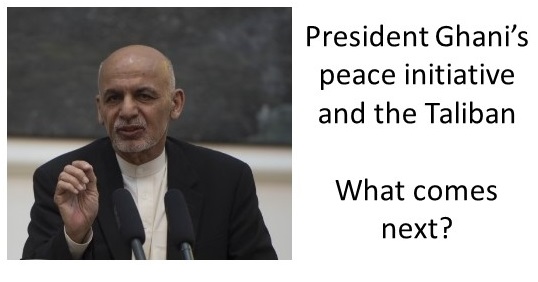 |
 |
|
Menu HomeAfghan ReportDaily ReadKabul NEOMapsGlossarySite MapAdsThis website is an Amazon Associate and earns money for qualifying purchases.
(SidebarLeftAds) |
Peace Package Offered to Taliban; What Next?by Abdul Rahman Rahmani, March 2018
On Tuesday, 28 February 2018 Afghan President Mohammad Ashraf Ghani proposed a detailed peace package to the Taliban in the Kabul Processís second meeting. President Ghaniís offer came just two days after the Taliban called on the United States to reopen peace dialogues and talk to them directly through their office in Qatar. With a long history of peace discussions in Afghanistan, what differences does this peace package bring? Along with a ceasefire proposal, the Afghan government offered the Taliban passports, shelter, and security for them and their family members, and promised the release of Taliban prisoners. But the most important aspects of the package were to recognize them as a political party, talks without preconditions, and amending the Afghanistan constitution. The last three offers are unique, new, and game changers; but what is more important is that what should be done next? The Taliban are losing support in Afghanistan especially, after their recent deadly attacks on civilians in Kabul and elsewhere in the country. Their will to fight is shattered because they did not have a clearly defined long-term strategy to compensate for the violence. So far, the Taliban have failed to propose a clear strategy for the future of Afghanistan, which is a critical vunerability and the Afghan government can exploit at any time. They are seen as a proxy of Pakistan through international communityís lens. With this in mind, the Taliban must understand that the peace package that has been offered by the Afghan government shows the Afghan governmentís seriousness and honesty toward peace in Afghanistan. Therefore, it could be the Talibanís last chance to negotiate. After 17 years of war, thousands of Afghan lives have been lost, our country destroyed, the Afghan morale, something that all Afghans had pride on, is shattered. And most important of all, our unity against our enemies like Pakistan and Iran is weakened. As a result, today most Afghans support the government call on peace talks to the Taliban through social media. This means that Afghans have a message to the Taliban: The Taliban, who considers themselves Afghans, should understand that this offer was not presented by any foreign country or people, but their own Afghans. Before the Kabul Process second meeting the Afghan government held many meetings with Afghan elders, Ulemas (religious leaders), women activists, and social activists. Therefore, it is not only an offer by Afghan government, but an offer that comes from the deep hearts of Afghan people who are exhausted from the war and destruction. The Taliban, who can see themselves in Afghanistanís future mirror, should grab this opportunity and, as Hisb-E-Islami, join an Afghan led peace talks. The Afghan government must have a clear strategy for the uncertainty of peace negotiations. For example, if the Taliban do not come to the negotiation table what should be the government stand? It is imperative that the Taliban should be announced as the Afghansí enemies, the distinction between good and bad Taliban should be removed, and they should be physically eliminated by security forces in all over Afghanistan. To gain this objective: First, before the Talibanís real commitment to peace negotiations, or more realistically a complete ceasefire in all Afghanistan, the Afghan government must not release the Talibanís prisoners since it will have negative impact on Afghan people if peace talks fail. Second, the Afghan government must not stop disrupting the Talibanís line of communication, destroying their headquarters that pose as a threat to Afghan security forces or civilians, and fighting the Taliban factions on the battlefield. This will allow the Afghan government to have the upper hand on peace talks and will allow it to be seen as a legitimate government to Afghans, through the Taliban and its foreign alliesí eyes. Third, in order to build a lasting trust between the people and the government, along with the peace talks and negotiations with the Taliban, the government must inform the Afghan people from the process step by step, something that have not been conducted during previews peace negotiations and was a major peace failure aspect. Fourth, the Afghan government must continue to hold meetings with elders, political parties, Ulemas, and other groups and individuals that can negatively or positively impact peace talks. The United Statesí new South Asia strategy seems to be working because: First of all the Taliban are failing to fight in the battlefield therefore, shifted their fight from local areas with military to cities against civilians. Secondly, Pakistan, who is known as the Talibanís major supporter, is under intense pressure from the international community which have impacted the Taliban to call for peace talks two times in a period of just two weeks, something that if Pakistan was not under pressure, could not have happened. These are the positive impacts of the US new strategy but are not the end line. The US must continue to pressure Pakistan in order to bring the Taliban into negotiation table and act divisively against the Taliban and Haqqani network key leaders who prefer to fight than settle with peace. This approach toward Pakistan changes the US and its alliesí war against the Taliban from the Sovietsí war against Mujahidin. Soviets did not engage Pakistan, who at the time was supporting Mujahidin which eventually led to Soviet defeat. The United States, unlike the Soviets, have the majority of Afghans on its side. To maintain this support, it is important to keep the pressure on Pakistan to bring a fraction of Afghans who are fighting against US, its allies, and Afghanistan by the name of Taliban, into negotiation table. The US must close the Talibanís Qatar office by pressuring Qatar government in order to let the peace talks be an Afghan dialogue. It must not repeat past mistakes negotiating with the Taliban independently since it would mean that the Afghan government is bypassed and its legitimacy is undermined and, the Taliban are recognized as a shadow government in Afghanistan. In conclusion, recognizing the Taliban as a political party, talking to them without preconditions, and amending Afghanistanís constitution for the better future of Afghanistan are great offers presented to the Taliban since their government was overthrown by the international community. The Taliban will not have the opportunity to be recognized as a political party in Afghanistan if they choose to fight. Therefore, they must use this opportunity to distance themselves from Pakistan and live a peaceful life in Afghanistan. At the same time, the Afghan government must not forget to fight decisively against those fractions of the Taliban who pose a a threat to the Afghan people. The United States must continue to pressure Pakistan, ban the Talibanís Qatar office, and allow the Afghan government to talk to the Taliban independently. Abdul Rahman Rahmani has a bachelor of sociology and philosophy from Kabul University, is an Afghan Army aviation pilot, and the author of the book, Afghanistan: A Collection of Stories. Rahmani is currently a student at the Expeditionary Warfare School, Marine Corps University in Quantico, Virginia. The conclusions and opinions expressed in this article are his alone and do not reflect the official position of the Afghan National Army, the Ministry of Defense, or the Government of the Islamic Republic of Afghanistan. He can be followed on Twitter at:
|
Books about AfghanistanAll external sites open up in a new window. |
|

